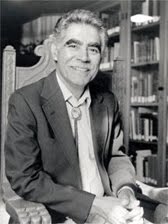California State University, Los Angeles
May 2-3, 2014
Deadline for proposals: January 31, 2014
Sponsored by Cal State L.A.’s Gigi Gaucher-Morales Memorial Conference Series, the College of Arts and Letters, the College of Natural and Social Sciences, the Department of Chicano Studies, the Department of English, and the Emeriti Association.
Call for Papers
Rudolfo A. Anaya (New Mexico, 1937) belongs to the first generation of Chicano writers who pioneered and charted one of the most vigorous and theoretically-grounded ethnic literatures in the United States. Anaya led the way since the early 1970s with his novel Bless Me, Ultima (recipient of the 1971 Quinto Sol Award), followed by other novels, short fiction, essays, poetry, drama, and children’s stories. Anaya’s defining impetus in the development of Chicano literature has been threefold. First of all, Anaya’s writings–deeply embedded in the cultural history of New Mexico–portray the American Southwest and its historical conflicts as central features in an aggressive and often violent national expansionism that spread westwards under the sign of modernity. This founding chapter in the history of the United States is represented in Anaya’s novels through vivid landscape descriptions and traces of autobiography subtly fictionalized and patterned after a literary heritage that includes Mexican/Chicano cultural history and the myths and literary traditions of the U.S. Southwest. Secondly, Anaya’s reconfiguration and reinvention of the American frontier and the wilderness–symbolic spaces that stand in U.S. history as a break with the past, the reinvention of the self, and the colonization of the alien–achieve in Anaya’s pages their literary representation in a style and narrative vision that have appealed in an equally compelling manner to both nonspecialist and scholarly readers. And third, Anaya’s work has been translated to many world languages, revealing implicit connections to world civilizations through the language of myth, legend, and national histories, and often turning into a critical arena for international scholarly debates on the analysis and interpretation of Chicano literature and, on a national and global levels, of U.S. and world literatures. Anaya’s work is thus an illustration of how ethnic literatures can avoid a narrow or naïve realism caught in the personal or local with no reference points to national and global implications. Anaya has received many awards, including the American Book Award, the National Medal of Arts, New Mexico Governor’s Award for Excellence in the Arts, and the prestigious Kellogg Foundation Fellowship Award.
The organizers of this conference propose a reexamination of Anaya’s work from the point of view of tradition, modernity, and the literatures of the U.S. Southwest, and according to the several phases of Anaya’s writing, from the early New Mexico trilogy that includes Bless Me Ultima (1972), Heart of Aztlán (1976), and Tortuga (1979), to Alburquerque (1992) and the tetralogy based on the four seasons: Zia Summer (1995), Rio Grande Fall (1996), Shaman Winter (1999), and Jemez Spring (2005), a narrative cycle in which Sonny Baca, the main character, functions as a detective and as the great-grandson of the legendary lawman Elfego Baca. Throughout Anaya’s writings the reader discovers and follows allusions to the early history of New Mexico, with references to Spanish explorers like Alvar Núñez Cabeza de Vaca (1490-1557), and Francisco Vázquez de Coronado (1510-1554), and to conquistadores, such as Juan de Oñate (1552-1626). Anaya’s narrative also has intertextual affiliations with the Spanish, Mexican, and U.S. literatures of the Southwest, from the epic poem by Gaspar Pérez de Villagrá, Historia de la Nueva México, 1610, and the Native American and Mexican myths and legends of New Mexico, to the seminal writings of James Fenimore Cooper, Henry David Thoreau, Ralph Waldo Emerson and, in the modern era, Cormac McCarthy’s narratives of the Mexico-U.S. border. Included in this proposed reexamination are Anaya’s recent novels, such as Randy López Goes Home (2011), and The Old Man’s Love Story (2013); the film adaptation of Bless Me, Ultima (2013); and Anaya’s essays, short fiction, plays, poems, and children’s stories.
Keynote Speaker:
Ramón A. Gutiérrez, University of Chicago
Featured Speakers:
Enrique R. Lamadrid, University of New Mexico
Ana Castillo, Independent Writer
Rolando Hinojosa-Smith, University of Texas at Austin
Rosaura Sánchez, University of California, San Diego
Mario Acevedo, Independent Writer
John Pohl, University of California, Los Angeles
José E. Limón, University of Notre Dame
The deadline for a one-page abstract of conference papers is January 31, 2014. The submitted abstracts will be peer-reviewed and their acceptance or rejection will be communicated by email on or before February 14, 2014. All abstracts submitted as electronic attachments should be sent directly to rcantu@calstatela.edu . By regular mail, send to:
Dr. Roberto Cantú
Professor of Chicano Studies and English
California State University, Los Angeles
5151 State University Drive
Los Angeles, CA 90032
For more information please visit: http://rudyanayaatcalstatela.blogspot.de

